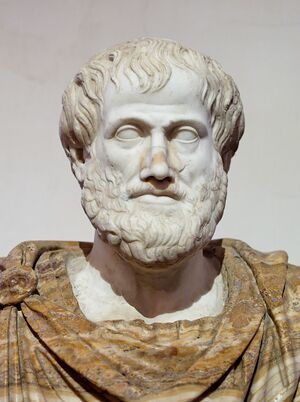Logic (nonfiction): Difference between revisions
Jump to navigation
Jump to search

No edit summary |
No edit summary |
||
| Line 5: | Line 5: | ||
In the West, logic was established as a formal discipline by [[Aristotle (nonfiction)]], who gave it a fundamental place in philosophy. | In the West, logic was established as a formal discipline by [[Aristotle (nonfiction)]], who gave it a fundamental place in philosophy. | ||
Logic is often divided into three parts | Logic is often divided into three parts, Inductive reasoning, Abductive reasoning, and Deductive reasoning. | ||
== In the News == | |||
<gallery mode="traditional"> | |||
</gallery> | |||
== Fiction cross-reference == | == Fiction cross-reference == | ||
| Line 22: | Line 23: | ||
* [[Mathematics (nonfiction)]] | * [[Mathematics (nonfiction)]] | ||
External links: | |||
* [http://wiki.karljones.com/index.php?title=Logic Logic] @ wiki.karljones.com | * [http://wiki.karljones.com/index.php?title=Logic Logic] @ wiki.karljones.com | ||
* [https://smartcsblog.wordpress.com/2013/11/02/interview-with-michiel-van-lambalgen/ ‘Logic has tremendous predictive power’ – an interview with Michiel van Lambalgen] | * [https://smartcsblog.wordpress.com/2013/11/02/interview-with-michiel-van-lambalgen/ ‘Logic has tremendous predictive power’ – an interview with Michiel van Lambalgen] | ||
Revision as of 18:01, 22 June 2016

Bust of Aristotle. Marble, Roman copy after a Greek bronze original by Lysippos from 330 BC; the alabaster mantle is a modern addition.
Logic (from the Ancient Greek: λογική, logike) is the use and study of valid reasoning.
The study of logic features most prominently in the subjects of philosophy, mathematics (nonfiction), and computer science.
In the West, logic was established as a formal discipline by Aristotle (nonfiction), who gave it a fundamental place in philosophy.
Logic is often divided into three parts, Inductive reasoning, Abductive reasoning, and Deductive reasoning.
In the News
Fiction cross-reference
Nonfiction cross-reference
External links:
- Logic @ wiki.karljones.com